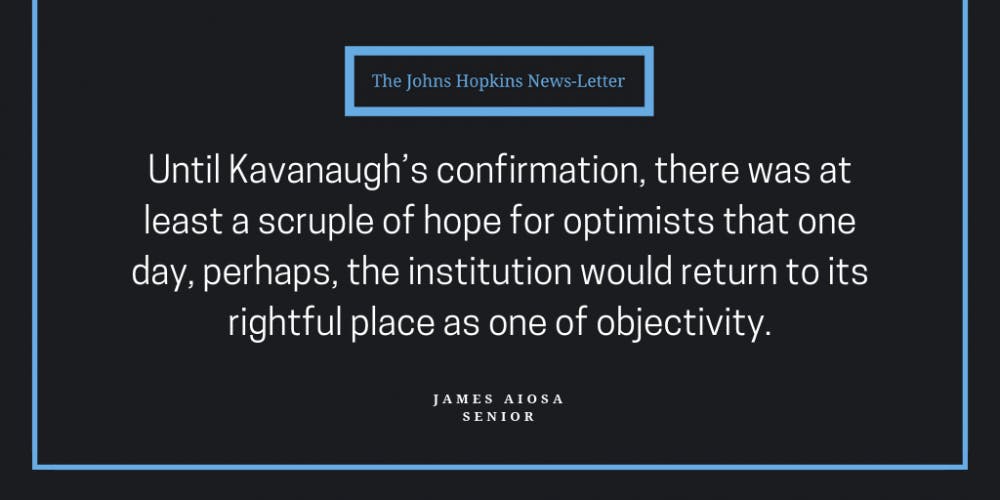In 1993, Ruth Bader Ginsburg was confirmed by a vote of 96 to three in the U.S. Senate. After the unprecedented nature of Brett Kavanaugh’s confirmation, we can safely say that such a bipartisan equilibrium will never again exist with respect to the Supreme Court.
Until Kavanaugh’s confirmation, there was at least a scruple of hope for optimists that one day, perhaps, the institution would return to its rightful place as one of objectivity.
I was one of those optimists and can comfortably say that such optimism is no longer possible. Never again will justices be afforded the smooth confirmation processes like that which Ginsburg and many before her enjoyed. Never again will a justice be nominated in hopes that he or she will be an nonpartisan arbiter of justice. Those days are gone.
The right rejoiced in victory, and Democrats were bitter, promising retribution in the form of impeaching Kavanaugh after the midterms. The result of this hyper-political unprecedented happening: We, the American people, lose. After feeling as though he was the target of a political hit job, Kavanaugh will likely rule in a uniformly conservative manner for decades, eager to deliver the left its comeuppance.
Senate Minority Leader Chuck Schumer explicitly stated his intention to oppose Kavanaugh, before any hearings, before any sexual assault allegations had surfaced. That set the tone for what would be a politically charged battle like no other.
Mitch McConnell vowed to get a vote in before the midterms; he succeeded. The divide was almost precisely along party lines, with some tossups like Lisa Murkowski, R-Ariz. and Joe Manchin, D-W.Va. But, for the most part, even before Christine Blasey Ford came forward with her allegations, he faced monolithic Democratic opposition. Once Blasey-Ford’s allegations surfaced, the integrity of the confirmation process had already been irrevocably tainted. Republicans cried smear campaign, while the Democrats pleaded for a full FBI investigation.
Enter several new accusers and both parties only more deeply entrenched themselves in opposition to each other. Republicans wouldn’t budge, and neither would Democrats. And, as with most things, the blame falls on both of them.
Dianne Feinstein, a Democratic senator from California, received Blasey Ford’s letter detailing her concerns with Brett Kavanaugh’s nominations given her harrowing experience with him in high school. Instead of organizing a private meeting with her in California, wherein Blasey-Ford could have given a private, personal testimony, Feinstein sat on the letter, which leaked to the press after Kavanaugh’s hearing, pushing Blasey-Ford to testify before the contentious Senate Committee on the Judiciary.
Make no mistake: This was grossly unfair to Blasey Ford, whose personal wellbeing was thrown to the wayside so Feinstein and the Democrats could maximize the political combustion her letter would spur.
The Republicans, on the other hand, were so desperate to get Kavanaugh confirmed that when pressured by Jeff Flake, R-Ariz., to conduct an FBI investigation, they accepted U.S. President Donald Trump’s “one-week long” time frame during which the FBI were permitted to conduct the investigation. One week — an embarrassingly punctuated time allotment so that Republicans could ram Kavanaugh through to the bench.
To reiterate, we are the losers in all of this. The Supreme Court is supposed to have non-partisan justices who decide the trajectory of our country not based on political belief or allegiance, but by determining the bounds of the law as expressed by the Constitution and our founding fathers. It is precisely the independence of our judiciary that separates the U.S. from other leading democracies of the world. And now, its fate has been sealed. Because Kavanaugh feels he was smeared by Democrats in an attempt to derail his nomination, he will be doubly motivated to strike down liberal positions in the cases he faces, a far cry from Justice Anthony Kennedy’s often unpredictable and nonpartisan rulings.
On the other hand, Democrats and Republicans have set a precedent for future nominees that will most certainly dissuade eminent and qualified candidates from stepping forward, afraid of whatever accusations — true or not — will be cast on them. Whether or not they’re innocent, their allegations will not get the full scope of inquiry they require. By the same token, victims of crimes like sexual assault will be reluctant to come forward as well, wary of the hyper-politicized process they surely will be dragged through and of the politicians who will use them like pawns to achieve a desired political end. And the American people, again, catch the short end of the stick.
James Aiosa is a senior studying Political Science and English.





